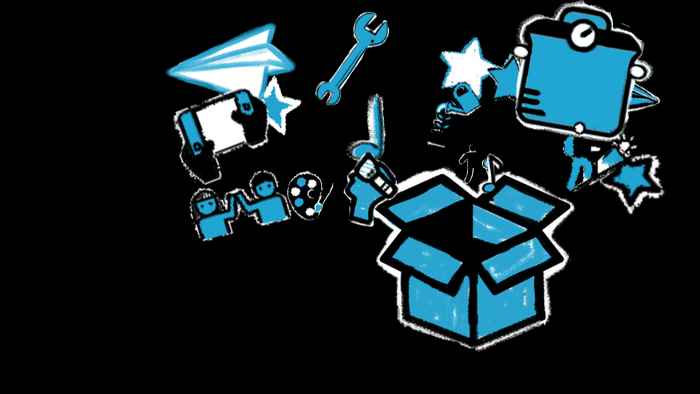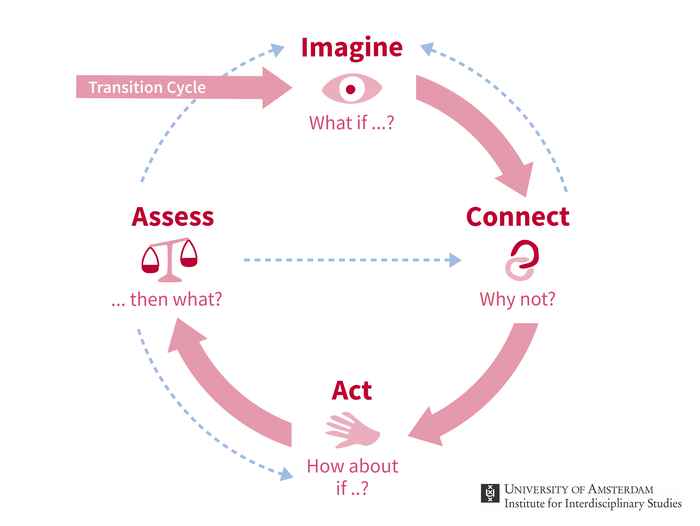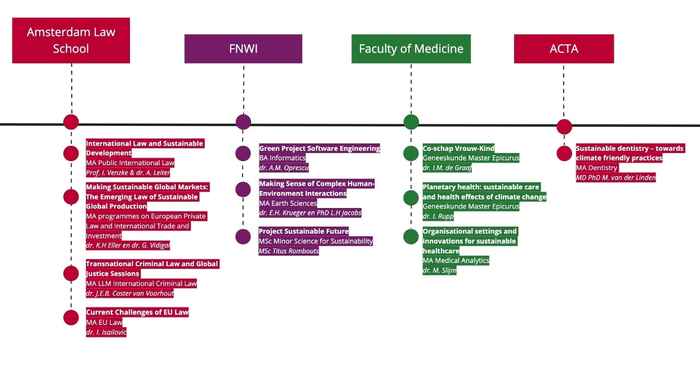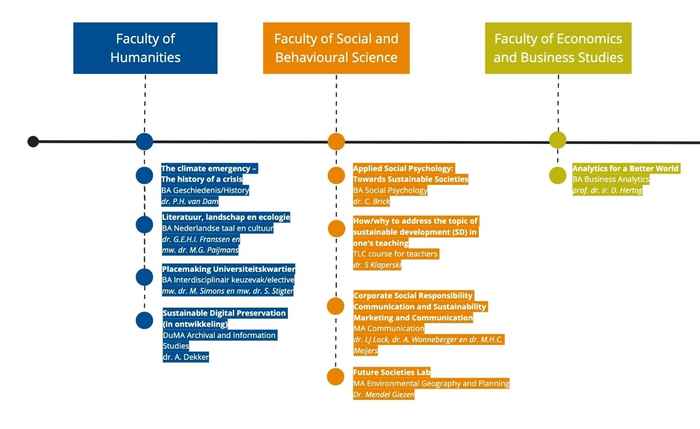In progress at the IIS
Room for experimentation
-
Local Global Think Tank
The United Nations' 17 Sustainable Development Goals are an urgent call to action. How can we solve complex problems, such as climate change, economic inequality, digitization, and gender inequality, on a global scale, taking into account the local context and implications? What local interventions can you develop to address global problems for a more sustainable future for people and the planet?
In the IIS elective "Building Bridges for Local-Global Challenges," UvA students together with students from European partner universities address these global goals, taking into account both local and international context(s). This project aims to strengthen the following skills of students: (1) intercultural communication and collaboration, and (2) developing project and co-creation skills on an international level. Students will work in a virtual team with students from European partner universities to solve one of these challenges.
For those students who have not had a study abroad experience, or cannot due to personal circumstances, this is a very nice alternative to still have a study abroad experience, without actually physically going abroad.
The course was launched for the first time in March 2022. Read the interview with senior lecturer Pauline Vromans here. In the second semester of the academic year 2023-2024, the course took place again. A spin-off of Local Global Think Tank was took place in the first semester of academic year 2024-25 in two bachelor programmes: 'Econometrics and Data Science' and 'Languages'. A modular educational programme was developed to create virtual collaborative projects that fit these students.
Do you also see opportunities for your programme or are you curious about the possibilities? Get in touch with us! We like to think along with you.
-
Shaping Transitions Learning Trajectory
Bachelor and master programmes feel the urgency to train students to become change-makers equipped with the skills to initiate, direct and guide change and major transition processes in the present and future world. You can think about skills such as critical thinking, being able to take perspectives, communication, and co-creation skills, but also working on empathy, openness, a learning attitude, courage, and perseverance.
The Learning Trajectory Shaping Transitions consist of several modules of learning objectives, learning activities, and tests for this type of education. This allows each course to see which transition skills fit within the curriculum. The Education Lab started developing a learning line in 2021-2022 with two courses at the FNWI (Chemistry and Science, Technology and Innovation) and one course at the FMG (Computational Social Science).
The ultimate goal of this project is to guide and support programmes in implementing Shaping Transitions modules within the curriculum and integrate them into the existing curriculum of the programme.
Is this trajectory also interesting for your programme? Then get in touch with us!
-
Transition Makers Toolbox
Shaping transitions requires vision, leadership and skills to initiate and direct change processes. It requires, for example, that you collaborate and reflect, connect perspectives and build bridges (between people and ideas), dare to experiment, make adjustments when things have to be different and dare to go against the flow and have resilience.
The IIS, together with Utrecht University, the alliance EWUU and University College Utrecht, has launched a toolbox for learning to shape societal transitions.
The Transition Makers Toolbox will be a place to:
- get informed or inspired (knowledge about designing transitions);
- find ready-to-go teaching materials you can use in your courses (from learning objectives to test forms);
- learn from and with each other (good practices and training courses);
- find the route to a tailored approach and ask for help with educational development related to shaping transitions.
Visit www.transitionmakers.nl and get inspired by the Transition Makers Toolbox, start implementing the tools in your education and spread the word!
Would you like to stay up-to-date on the co-creation of the Toolbox?

-
Honours module: The Next Great/Small Transformation
Society is facing urgent and complex challenges, such as climate change, inequality, pandemics and digitisation. Because these issues are firmly rooted in existing societal structures and institutions, shaping societal transitions requires radical changes in the current way of thinking and acting. We must fundamentally change the way we deal with these pressing issues, but we don't know how. There is a high degree of uncertainty about the direction of the transitions and, moreover, there is often resistance to change. How to move forward?
In the Honours module 'The Next Great/Small Transformation', we critically and constructively introduce students to conceptual and operational tools for shaping transitions. Using these tools, interdisciplinary teams of students will identify a societal transition challenge and develop a strategy to address it. At the same time, students are encouraged to critically evaluate the tools and suggest improvements.

The process central to this course consists of four iterative phases:
- Imagine: Identifying a transition challenge and identifying a vision that can address it;
- Connect: Learning to understand the challenge at the system level;
- Act: devising and implementing a simple intervention to realize the vision;
- Assess: monitoring and evaluating the impact of the intervention (both of the intervention itself and the system-level impact).
In the first edition of the course in the fall of 2021, a round table meeting was organised with interesting guests to inspire the students. Read more about the teaching methods used and the set-up of the course here. The third edition of 'The Next Great/Small Transformation' started in September 2022.
"Our project was about transforming the elderly care system that allows the elderly to get the care they deserve. During the course, I learned how to successfully implement system thinking to real-life problems to come up with interventions that can create changes in a larger system (such as society). Additionally, I learned to “dream big” concerning the possibilities of changing small things in the world we live in to make it a better place!"
Franziska (student 'The Next Great Small Transformation' in 2022)
-
Special Interest Group: Impact Learning
As teachers and educational developers, we are committed to providing students with education that allows them to learn about society as well as to make an impact. The Special Interest Group Impact Learning, a collaboration between the IIS and the Teaching & Learning Centre, is a network with the aim of making impact learning more common practice at the UvA and exchanging knowledge between interested parties and experts in the field. We do this by organising meetings on topics such as impact learning and assessment, client involvement, or impact learning and policy. During the meetings, we will hear from experts in the field and we will mainly address practical questions and experiences.
Impact Learning Day
On Friday 4 November 2022, IIS and TLC organised a successful Impact Learning Day at the Amsterdam Law Hub. Both participants and speakers from inside and outside the UvA came together to share ideas around impact learning. Sabine Uijl started the afternoon with a keynote on how, together with the knowledge alliance TU/e, WUR, UU, and UMC Utrecht, they are developing education that is innovative and flexible to make future change makers of students. Furthermore, Edwin Monink talked about how his studio tries to make an impact on the future through science fiction. In addition, three different UvA teachers shared about their way of impact learning in their teaching and we also learned about Acts of Citizenship - in this case combining musical theater and research to generate impact. We received positive feedback from many participants afterward. Mentioned examples were found inspiring, it was nice to meet like-minded people, and also to exchange information and ideas with each other.
Contact
Interested parties can join the Teams channel or contact Katusha Sol:



-
Special Interest Group: Sustainabilty
On the topic of sustainability, IIS and TLC support teachers through a grant. In three rounds, a total of 18 UvA lecturers received the UvA Sustainability Grant. This grant offers lecturers from all faculties the opportunity to integrate their ideas on sustainability into their teaching and develop them into concrete teaching activities. Coyan Tromp (lecturer and curriculum designer at Future Planet Studies), from the IIS, provides content support to the lecturers in implementing their plans. In addition to the grant, a Special Interest Group has now been established for these teachers and others interested in developing sustainability education led by Coyan Tromp. In this group, knowledge and materials will is shared that further help teachers implement sustainability within their teaching. Intervision sessions with sustainability pioneers (teachers who have used the sustainability grant) and other meetings are also initiated. Some examples of sustainability courses that affiliated teachers are working on: "Sustainable Digital Preservation" (MA Archival and Information Studies), "How/why to address the topic of sustainable development (SD) in one's teaching" (TLC course for teachers) and "Sustainable dentistry - towards climate-friendly practices" (ACTA).

